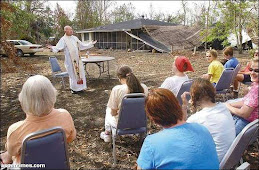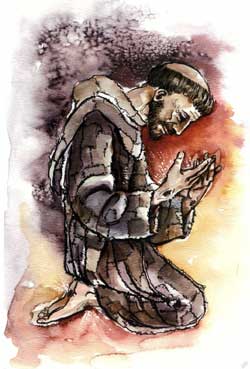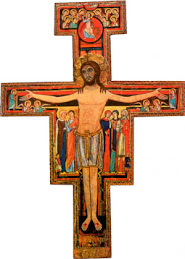Sacrum Commercium Sancti Francisci cum Domina Paupertate is the Latin name for this allegory. It describes Franciscan poverty as a commitment to be followed by those who want to live the Gospel life. The author and date of this writing are unknown, but the date seems to be after the death of Saint Francis, perhaps in the middle of the thirteenth century.
In the prologue, the kingdom of heaven is presented as belonging to those who possess nothing. Francis is led to search for Lady Poverty because to her “the Lord had entrusted the keys of the kingdom of heaven.”
Sacrum Commercium is based upon a dialogue between Francis and Lady Poverty. She lives all by herself on a mountain. Francis easily climbs this mountain, because he is not encumbered by possessions. On the mountain, he praises Lady Poverty, “since the Son of God, the Lord of virtue and the King of glory, fell in love with this virtue with a special affection. He sought, found, and embraced it while achieving our salvation in the middle of the earth.” Lady Poverty is described as a most faithful spouse, a sweet lover, and the queen of virtues. She responds to Francis by giving an account of the whole history of salvation from Adam until Christ.
"I was once in the paradise of God, where man was naked. In fact, I was in man and was walking with naked man through that entire splendid paradise, fearing nothing, doubting nothing, and suspecting nothing amiss. I thought I would be with him forever, because the Most High created him just, good and wise and placed in the most delightful place. I was so happy playing before him all the while because, possessing nothing, he belonged entirely to God."
Lady Poverty continues to analyze the history of the Church. From apostolic times in Jerusalem, poverty passes over to the peace of Constantine. This marks the beginning of the Church’s relaxation in commitment to poverty. Later there is the birth of monasticism when poverty is rediscovered in the Church, but the monastic orders did not remain faithful to Poverty. The Christian proposal of Francis is an answer to Poverty’s wishes.
The Sacrum Commercium concludes by describing a meal prepared by Francis and the brothers for Lady Poverty. She rejoices at the extremely poor way of life which Francis and the brothers lead. After having a frugal meal and resting on a stone for a pillow, Lady Poverty asks the friars to show her their enclosure. Francis and the brothers lead her upon a hill and show her all the world, telling her: “This, Lady, is our enclosure.”
She blesses Francis and the brothers, urging them to persevere in the grace they have received, ending the story with her beautiful words:
“Therefore, I beg you, brothers, through the mercy of God which has made you so poor, do that for which you have come, that for which you have risen up from the waters of Babylon. Humbly receive the grace offered you. Always use it worthily for the praise and glory and honor of Him Who died for you, Jesus Christ, our Lord, Who lives and reigns, conquers and rules with the Father and the Holy Spirit, God eternally glorious, forever and ever. Amen.”


















2 comments:
Little has changed for Lady Poverty; she is still abandoned, and yet waiting for those who can recognize her wisdom and loveliness.
Blessed are the poor/Blessed are the poor in spirit...the Kingdom of God belongs to them.
Thanks for your visit and comment. My plan this morning was to read about penance but I ended up reading this story about Lady Poverty. It is one of the favorite stories of our dear friend, Sr. Fidelis Hart, OSC, in New Orleans. She wrote a play once, using this story as the basis.
Post a Comment